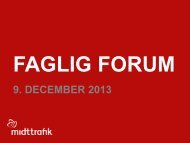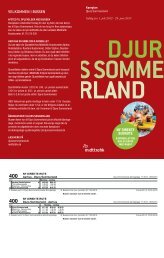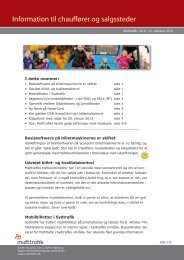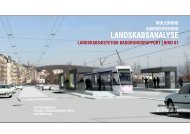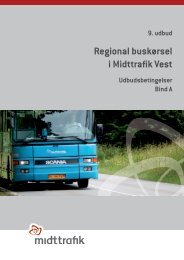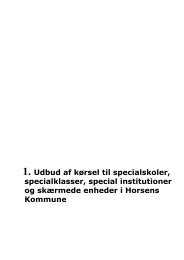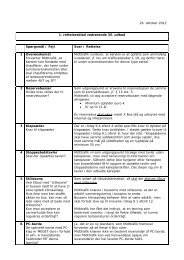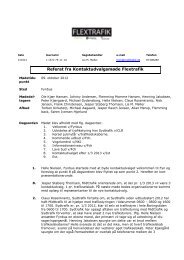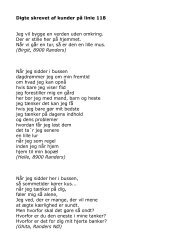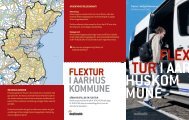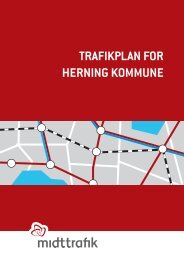Storskalaprojekt med forsyning af AFME biodiesel i ... - Trafikstyrelsen
Storskalaprojekt med forsyning af AFME biodiesel i ... - Trafikstyrelsen
Storskalaprojekt med forsyning af AFME biodiesel i ... - Trafikstyrelsen
Create successful ePaper yourself
Turn your PDF publications into a flip-book with our unique Google optimized e-Paper software.
tanks as well as for a screening of microbial growth. A low water and bacteria level<br />
was observed, but nothing critical. New procedures for bacteria testing are demanded<br />
as there have been increased problems with microbial growth in tanks from other<br />
countries, where bio-components are mixed with fossil fuels. Good tank management<br />
is very important; water and sediments in the tanks must be avoided.<br />
Respect to competition rules has meant that purchasing of fuel has been carried out<br />
decentrally in the individual oil companies. The project has given the companies<br />
experience with respect to purchasing of bio-components and as an extension of this,<br />
they are better prepared for co-ordination of exchange agreements etc in the future<br />
where many different bio-components will in all probability be used. Again, the<br />
interaction of components will play a role as will sustainability criteria for the<br />
individual biofuels and companies’ strategies for maintenance of their responsibilities<br />
with respect to legal requirements for promotion of biofuels. Biodiesel in the test is<br />
accounted <strong>af</strong>ter the market index, which has varied considerably during the test<br />
period. This has also given the partners an understanding of the mechanisms which<br />
are involved in defining market prices for biofuels.<br />
Follow up evaluations have shown that the communication campaign run has been<br />
effective and sufficient, and there have been very few contacts or questions relating to<br />
the product itself. There is a need to communicate more effectively concerning car<br />
makers’ use of the word <strong>biodiesel</strong>. Manufacturers such as Ford, Mercedes, SEAT,<br />
Skoda and VW refer in vehicle manuals etc that certain vehicles are not able to drive<br />
on <strong>biodiesel</strong>. According to the Danish importers, this refers to the pure <strong>biodiesel</strong> B100.<br />
Communication to boat owners is also important with respect to a future use of<br />
biofuels, as boat engines are more at risk from microbial growth – the so-called<br />
“diesel plague”, usually caused by a build up of condensation in the motor, during the<br />
winter months when the boat is not used, leading to potential bacterial growth.<br />
A relatively large proportion of bus passengers have noticed that buses in Aarhus<br />
drove on <strong>biodiesel</strong> fuel. On being asked, all bus passengers were positive towards the<br />
action. It was slightly surprising that those who had the largest transport<br />
requirements were most prepared to pay for a less environmentally damaging fuel.<br />
The same tendency could also be observed among motorists. The question remains<br />
however, whether the intention will also be confir<strong>med</strong> in reality.<br />
The project has been interesting for journalists, not least from the popular notion of<br />
putting dead animals into the fuel tank. A search at the end of November 2009,<br />
showed over 240 printed articles as well as radio and TV information.<br />
Implementation of the project has led to a saving of approximately 6800 tonnes CO2<br />
in the region of Central Denmark. The saving corresponds to 0.06% of the Danish<br />
transport sectors total emissions. If Daka’s <strong>biodiesel</strong> was used as a substitute for all<br />
fossil fuel in the transport sector the saving would be 124.000 tonnes CO2 or roughly<br />
1% of the total emissions from transport. Based on the project’s total cost of ca. kr.<br />
17 million, this suggests a price of kr. 2.500 per ton CO2 saved. Without investments<br />
in plant storage facilities and other project specific costs for administration etc, the<br />
price per ton reduced CO2 falls to ca. kr. 1.100. Further optimisation of the base diesel<br />
is expected to bring this cost down further. This is a high replace cost generally, but<br />
cheap and competitive compared with other CO2 reducing actions in the transport<br />
5



